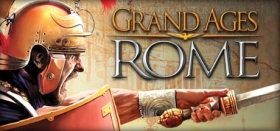Grand Ages: Rome
Many moons ago, city-building games were all the rage; Sierra's Caesar and Pharaoh series appealed to history enthusiasts, The Settlers games were the cult favourite whilst Sim City was the one to beat. Nowadays Impressions Games (the developers behind Sierra's city-builders) are no more, Blue Byte have been consumed by Ubisoft and are relegated to milking their former glory with lacklustre remakes. Will Wright is one of the few to outlast his virtual cities, however these days he is more concerned with the lives of individual Sims, or interfering with the theory of evolution.
Haemimont Games, recent inheritors of the fabulous Tropico franchise, are seeking to reinvigorate the classic city-building genre by mixing in RTS mechanics along with a pinch of RPG for good measure.
Grand Ages: Rome follows the traditional formula of calling on the player to expand their settlements and meet a series of criteria whilst balancing the needs and desire of their citizens. Campaign mission goals normally revolve around trade, city development or military conquest; alternatively a number of the maps are available to play in Free Build mode, giving the player the option to construct a city without the objectives.
City inhabitants are split into three social classes - Plebians, Equites and Patricians - each has more needs that require fulfilling than the previous. For example, Plebians only require food to be happy, Equites additionally require entertainment and Patricians also desire religion.
It's all well and good wanting luxuries, but those luxuries must come from somewhere. Thankfully there is an extensive supply chain that will ensure your citizens are working hard for their creature comforts; a number of these structures can be staffed by different classes for improved productivity, whilst some can also resort to slave labour.
Resources themselves are not stockpiled; rather supply must outweigh consumption, meaning it's rare to be waiting for sufficient resources to be collected in order to continue building other than when running low on Denarii, the games currency. One minor issue is that whilst satisfaction providing structures operate on an ‘area-of-effect' basis, resource gathering and producing structures contribute to a universal pool without needing transportation or storage - as a result, a butchers shop will happily produce sausages even if the pig farm that supplies it is located on the other side of the map.
With a city's expansion (or as the campaign scenario dictates) you will often encounter hostiles, either in the form of local barbarian villages or an organised enemy force. Assuming the appropriate military structures have been constructed, it is possible to recruit squads to defend your walls. Unfortunately the resulting RTS action is less Rome: Total War, and more Age of Empires - combat is limited with massed ranks more likely to win battles than any particular strategic decisions.
Success in individual missions awards points which can be spent on numerous talents that confer a variety of bonuses which can be carried between missions. There is also the option to purchase a selection of territories which grant additional resources once they have been unlocked through secondary mission objectives.
Graphically, the game does not disappoint; individual units and buildings are lovingly detailed, day blends seamlessly into night and the camera zooms smoothly between tightest and widest views. Unfortunately there are a handful of issues, mainly revolving around structures not being as solid as they would first appear - spend any amount of time at the maximum zoom watching citizens go about their lives and you will frequently see people taking shortcuts by walking through buildings; similarly trade caravans crossing rivers will walk directly through the bridge and water, leaving only the caravan master with his feet dry.
The interface is very streamlined with a row of context sensitive icons showing resource availability and satisfaction levels, whilst building is handled by a single circular right-click menu. This works well but can lag slightly when switching between build categories.
Ambient sound effects do a good job of bringing the city to life but can quickly become repetitive - after you've heard a hyena being whipped for the twentieth time, you begin to question the reasoning behind allowing hyenas to roam your city regardless of whether they are being followed by a man with a whip or not.
Multiplayer games come in both competitive and cooperative flavours with Team City mode granting multiple players control over a single city, however there is no LAN support for anyone able to get their friend(s) within the reach of a network cable.
Despite all the effort that has gone in to creating a game that is both streamlined and deep, Grand Ages: Rome fails to deliver in a number of areas, including the previously mentioned poor combat mechanics. This would not be such a big issue if the foundation of the game, the city building, was solid, however as there are no restrictions on which buildings are available in the campaign missions you find that you are repeatedly building the same city albeit with a slightly different landscape each time.

Ultimately it's hard to recommend the game for fans of the city-building genre; players looking for a more in-depth and challenging economic experience should probably look towards something like the two year old Anno 1701 (assuming they haven't already mastered it). Newcomers to this RTS subset or gamers looking for an easily accessible interpretation could do a lot worse than picking up a copy of Grand Ages: Rome.
Grand Ages: Rome (Reviewed on Windows)
This game is good, with a few negatives.
Ultimately it's hard to recommend the game for fans of the city-building genre; players looking for a more in-depth and challenging economic experience should probably look towards something like the two year old Anno 1701 (assuming they haven't already mastered it). Newcomers to this RTS subset or gamers looking for an easily accessible interpretation could do a lot worse than picking up a copy of Grand Ages: Rome.










COMMENTS